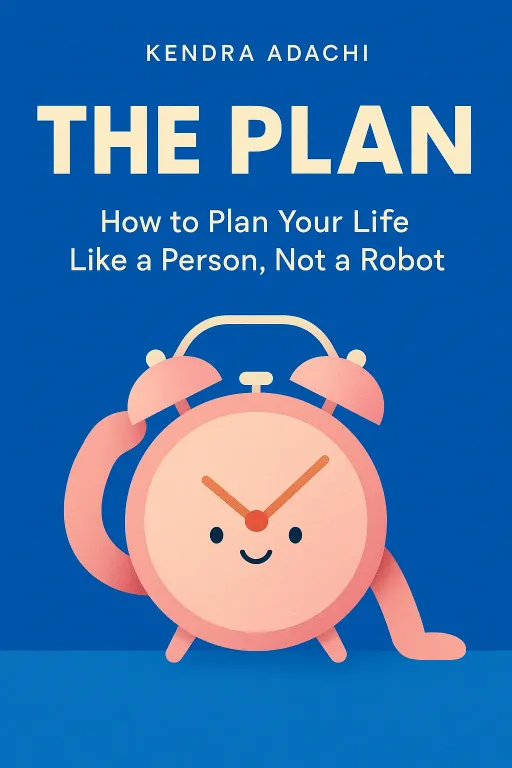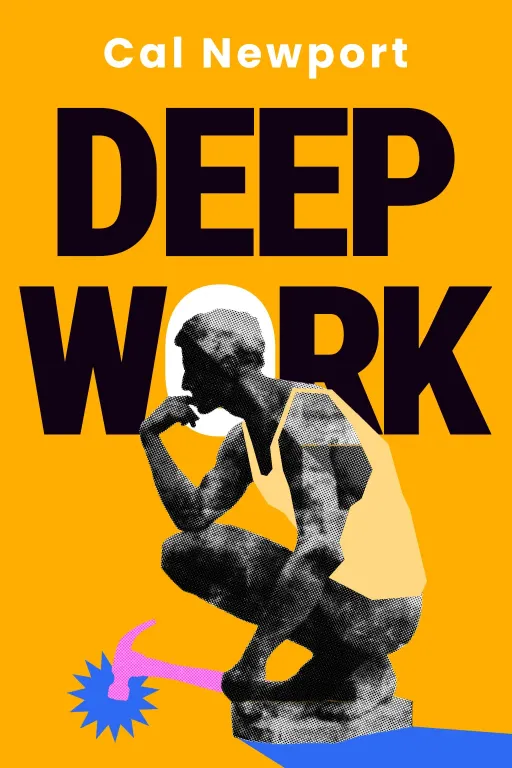
The PLAN
10 minHow to Plan Your Life Like a Person, Not a Robot
Introduction
Narrator: Imagine it’s Sunday night. The familiar, low-grade anxiety of the week ahead begins to creep in—the "Sunday Scaries." To combat it, you pull out a brand-new planner, an array of colorful pens, and your laptop. You meticulously craft the perfect week, color-coding your calendar, scheduling workouts, planning healthy meals, and blocking out time for deep work. You manufacture a vision of hyper-productivity, a week where you will finally get it all done. Yet, by Wednesday, the plan has shattered. An unexpected crisis, a sick child, or sheer exhaustion derails your perfect schedule, leaving you feeling like a failure. You're left wondering, "What is wrong with me?"
In her book, The PLAN: How to Plan Your Life Like a Person, Not a Robot, author Kendra Adachi argues that the problem isn't you—it's the plan itself. She reveals that the entire paradigm of modern productivity was built on a foundation that fundamentally misunderstands the lives most people, and especially women, actually live. Adachi offers a new way forward, a compassionate framework for managing time that values integration over greatness and humanity over robotic efficiency.
The Productivity Game is Rigged Against Women
Key Insight 1
Narrator: Adachi begins with a startling revelation: the entire field of time management is built on a flawed premise. Through her own analysis, she discovered that a staggering 93 percent of time-management books are written by men. The advice they offer, while often well-intentioned, is tailored for a life that doesn't account for the complex realities many women face. It rarely considers the cyclical nature of hormones, the disproportionate burden of managing a home, or the societal pressure to be everything to everyone. As Adachi puts it, "The problem isn’t you. It’s not your lack of dedication, consistency, or motivation... It’s because the current productivity paradigm doesn’t work for women."
This paradigm is part of what she calls the "productivity-industrial complex," a system that thrives on our dissatisfaction. It sells us the idea that if we just find the right tool, hack, or habit, we can optimize our way to a perfect life. Adachi illustrates this with a scene from the movie Sabrina, where a workaholic businessman takes a helicopter to save time, only to immediately pull out his work on the flight. When asked why he isn't enjoying the moment, he replies that he's "storing it up." This is the lie of optimization: that time is a resource to be hoarded for future efficiency rather than a reality to be lived. For women, whose lives are often oriented around everything but themselves, this approach is not just ineffective; it's a recipe for burnout.
Pursue Integration, Not Greatness
Key Insight 2
Narrator: To escape the productivity trap, Adachi proposes two foundational beliefs that change everything. The first is that the goal is not greatness, but integration. The second is to start where you are, not where you want to be. The relentless pursuit of "greatness"—mastering your body, cultivating a champion's mindset, developing hustle—is an exhausting and often alienating goal. Integration, on the other hand, is about compassionately bringing all parts of yourself to the table: your desires, your limitations, your emotions, and your experiences. It’s about living wholeheartedly in the center of who you are right now.
Adachi shares a powerful analogy from her therapist to illustrate this. She described feeling like she was drowning in the ocean of "everything at once," believing the only solution was to magically teleport to the shore. Her therapist offered a different vision. Instead of trying to reach the shore immediately, she just needed to find the "taco floatie" that was right beside her. She could grab on, catch her breath, and just rest. From there, she might find the strength to kick toward a floating platform, and eventually, she would reach the beach. The point wasn't to instantly achieve the goal, but to be present and kind to herself in the process. This is the essence of starting where you are: tending to your immediate needs with compassion, one small step at a time.
The PLAN is a Flexible Framework, Not a Rigid Rulebook
Key Insight 3
Narrator: Adachi’s central framework is The PLAN, an acronym for Prepare, Live, Adjust, and Notice. She visualizes it as a pyramid. The foundation is "What Matters Now," the singular priority for your current season of life. The three sides are Prepare, Adjust, and Notice, and the apex, the entire point of the structure, is to Live. This isn't a linear checklist but a dynamic, interconnected system for navigating life.
To explain this, she contrasts two powerful metaphors: life as a puzzle versus life as a painting. Traditional productivity treats life like a puzzle, with a fixed number of pieces that fit together in one correct way. This creates immense pressure to find the "right" solution and immense guilt when the pieces don't fit. Adachi argues that life is much more like a painting. It’s a creative, fluid process with no single right answer. You can change colors, paint over sections, and adapt your vision as you go. The goal is not to perfectly assemble a predetermined image but to engage with the canvas of your life with flexibility and humanity. This mindset is echoed in the philosophy of Alice Roosevelt Longworth, who famously said her rule for life was to "Fill what’s empty, empty what’s full, and scratch where it itches."
Align Your Plan with Your Natural Rhythms
Key Insight 4
Narrator: One of the book's most transformative insights is its direct engagement with the female hormonal cycle as a time-management tool. Adachi points out that men’s energy typically follows a 24-hour cycle, making their productivity more consistent day-to-day. Women, however, operate on an approximately 28-day cycle, with distinct hormonal phases that dramatically impact energy, mood, and cognitive strengths. For centuries, this reality was dismissed or pathologized, from ancient Greek theories of the "wandering womb" causing hysteria to more modern medical biases.
Adachi reclaims this biological rhythm as a source of power by aligning it with The PLAN framework and the four seasons. * The Menstrual Phase is like Winter, a time for rest and reflection. This aligns with Notice. * The Follicular Phase is like Spring, a time of rising energy and new ideas. This aligns with Prepare. * The Ovulation Phase is like Summer, a peak of energy and social connection. This aligns with Live. * The Luteal Phase is like Fall, a time for organizing, finishing tasks, and turning inward. This aligns with Adjust. By understanding these phases, women can stop fighting their bodies and instead plan their activities to flow with their natural energy, managing their energy instead of just their time.
Lighten the Load with a Better To-Do List
Key Insight 5
Narrator: Moving from principle to practice, Adachi offers the "Lighten the Load" framework to revolutionize the dreaded to-do list. She explains that the brain struggles with unstructured lists, which is why they often feel overwhelming. Her framework provides a compassionate structure. 1. Make It Visible: Do a "brain dump" to get every task out of your head and onto paper. 2. Make It Matter: Assign significance to each task. Adachi uses her "Lazy Genius" language: Is this a "genius" task that requires your best energy, or a "lazy" one that just needs to get done? 3. Make It Smaller: Break down large, vague projects into concrete decisions and actions. The task "Decorate for Christmas," for example, isn't one item; it’s a dozen smaller steps, from deciding on a theme to bringing down bins and hanging stockings. 4. Make It Happen: Organize your tasks. This can be done by urgency (Now, Soon, Later), by energy (What's in the Tank?), by similarity (batching similar tasks), or by humanity. The "Pick One" method, for when you're completely overwhelmed, simply asks you to choose one thing and let the rest go, because staying grounded is better than staying on task.
Conclusion
Narrator: The single most important takeaway from The PLAN is that effective time management is not about becoming a more efficient robot; it's about becoming a more compassionate human. The goal is to stop chasing an external, culturally defined ideal of "greatness" and instead turn inward to build an integrated life that honors your unique needs, rhythms, and priorities in whatever season you find yourself. It’s a profound shift from optimizing your life to actually living it.
The book’s most challenging idea is its call to reject the deep-seated belief that our productivity defines our worth. Its real-world impact is giving women a powerful permission slip: permission to stop playing a game that was never designed for them to win. So, as you move forward, consider this challenge: What is one thing you can let go of this week—one "should," one unrealistic expectation—not to become more productive, but simply to become more yourself?









